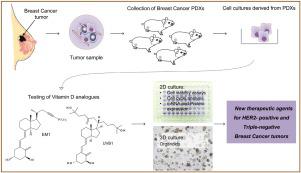The Journal of Steroid Biochemistry and Molecular Biology ( IF 2.7 ) Pub Date : 2020-08-09 , DOI: 10.1016/j.jsbmb.2020.105735 María Julia Ferronato 1 , Mercedes Nadal Serrano 2 , Enrique Javier Arenas Lahuerta 2 , Cristina Bernadó Morales 2 , Giuliana Paolillo 1 , Alex Martinez-Sabadell Aliguer 2 , Hugo Santalla 3 , Marilina Mascaró 1 , Cristian Vitale 4 , Yagamare Fall 3 , Joaquín Arribas 5 , María Marta Facchinetti 1 , Alejandro Carlos Curino 1

|
Despite advances in breast cancer (BC) treatment, its mortality remains high due to intrinsic or acquired resistance to therapy. Several ongoing efforts are being made to develop novel drugs to treat this pathology with the aim to overcome resistance, prolong patient survival and improve their quality of life. We have previously shown that the non-hypercalcemic vitamin D analogues EM1 and UVB1 display antitumor effects in preclinical studies employing conventional cell lines and animal models developed from these cells. In this work, we explored the antitumor effects of EM1 and UVB1 employing BC cells derived from patient-derived xenografts (PDXs), which are a powerful preclinical tool for testing new drugs. We demonstrated that the analogues reduced the viability of HER2-positive and Triple Negative BC-PDXs. Moreover, using an in vitro model of acquired resistance to Trastuzumab-emtansine, UVB1 displayed anti-proliferative actions under 2D and 3D culture conditions. It inhibited both formation and growth of established organoids. In addition, a direct correlation between UVB1 antitumor effects and VDR expression in PDXs was found. In conclusion, all the results reinforce the potential use of these vitamin D analogues as antitumor agents to treat HER2-positive and Triple Negative BC.
中文翻译:

维生素D类似物在乳腺癌患者衍生的异种移植细胞中表现出抗肿瘤活性。
尽管乳腺癌(BC)治疗取得了进步,但由于对治疗的内在或获得性耐药,其死亡率仍然很高。为了克服这种抗药性,延长患者的生存率并改善其生活质量,正在为开发用于治疗这种病理的新药而进行了数项正在进行的努力。我们以前已经证明,在使用常规细胞系和从这些细胞发育的动物模型进行的临床前研究中,非高钙血症维生素D类似物EM1和UVB1显示出抗肿瘤作用。在这项工作中,我们利用源自患者的异种移植物(PDXs)的BC细胞探索了EM1和UVB1的抗肿瘤作用,后者是测试新药的强大临床前工具。我们证明了类似物降低了HER2阳性和三阴性BC-PDX的活力。此外,使用获得性抗曲妥珠单抗-坦丹碱的体外模型,UVB1在2D和3D培养条件下显示出抗增殖作用。它抑制既定类器官的形成和生长。此外,还发现了UVB1抗肿瘤作用与PDX中VDR表达之间的直接相关性。总之,所有结果都增强了这些维生素D类似物作为抗肿瘤药治疗HER2阳性和三阴性BC的潜力。











































 京公网安备 11010802027423号
京公网安备 11010802027423号